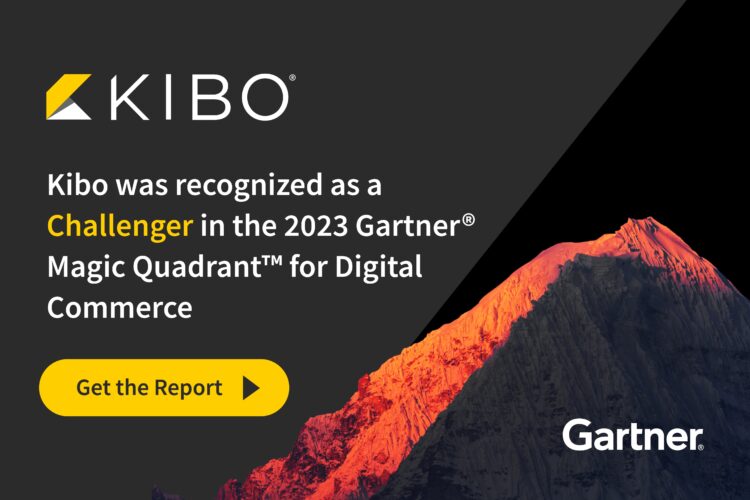Kibo was named a Challenger in the 2023 Gartner Magic Quadrant Report for Digital Commerce based on Ability to Execute and Completeness of Vision.
In the 2023 Gartner Critical Capabilities for Digital Commerce, Kibo was ranked in the following Use Cases: B2C Digital Commerce (3.77/5), B2B Digital Commerce (3.76/5), B2C and B2B Digital Commerce on Same Platform (3.78/5), Composable Commerce (4.12/5) and Complex Business Models (3.98/5). From our perspective, these Use Cases align with Kibo’s focus on infusing simplicity and sophistication with modern architecture to empower clients to customize their technology landscapes to fit their business flow and evolving needs for adaptation and innovation.
Leverage composability for maximum flexibility
Composability refers to business practices that allow Kibo’s clients to easily assemble and disassemble parts of their tech stacks when needed. Ultimately, the goal is to support adaptation and innovation without overhauling technology infrastructures.
MACH environments — which are flexible, modular enterprise-tech stacks — allow Kibo’s clients to plug-and-play different parts of their businesses while building the agility to respond quickly to changes in customer behavior and demand.
Investing in Kibo’s composable commerce platform has paid off: On average, Kibo clients realize a 1,050% combined ROI in just one year on its composable commerce platform. Clients are achieving these results by significantly improving key metrics: revenue, order value, conversion rate, total orders, number of items per order, return rates, and order-fulfillment speed.
Because MACH environments are designed to accommodate technological innovations without extensive rework, Kibo’s clients can easily adopt new tools, features, and capabilities. Future-proofing innovation ensures that clients can continuously enhance their offerings to build competitive advantage.
Build in business-model scalability
Clients choose Kibo’s composable commerce platform because its flexible design enables accelerated scalability, rapid business growth, and next-generation innovation.
A scalable infrastructure can handle spikes in traffic, sales, and transaction volume without compromising performance — these spikes can occur seasonally, or when manufacturers are expanding into new markets or product lines.
As business needs become more sophisticated, scalable infrastructure can support complex product catalogs, dynamic pricing, customized promotions, and personalization capabilities.
Kibo’s clients also benefit from headless commerce, which refers to an innovative architecture that separates the front-end user interface from the back-end commerce functionalities to enable better flexibility in designing customer experiences across various platforms and devices.
Master core commerce capabilities
Core commerce capabilities are measured based on the quality, sophistication, and ease of use of the core commerce functions of the platform.
Catalog management should be structured for maximum control and flexibility. Kibo’s file manager and quick-edit features can quickly locate and organize product images and make bulk edits to product attributes within the same application.
Search capabilities, such as product recommendations and boosted search results, enable retailers to drive incremental revenue and personalized shopping experiences. Kibo’s search features provide retailers more control over aligning goals to customer search.
A solid pricing and promotions engine helps retailers refine marketing efforts and segmentation strategies. Kibo’s engine can handle complex pricing rules while providing transparency for shoppers without IT involvement.
The convergence of core commerce elements empowers retailers to provide a more cohesive and customer-centric shopping experience while optimizing operations and agility to remain competitive in the marketplace.
Click here to download the full 2023 Gartner Magic Quadrant for Digital Commerce report.
Gartner, Magic Quadrant for Digital Commerce, Mike Lowndes, Yanna Dharmasthira, Sandy Shen, Penny Gillespie, Aditya Vasudevan, Jason Daigler, 21 August 2023.
Gartner, Critical Capabilities for Digital Commerce, Aditya Vasudevan, Yanna Dharmasthira, Sandy Shen, Penny Gillespie, Jason Daigler, Mike Lowndes, 21 August 2023.
GARTNER is a registered trademark and service mark of Gartner, Inc. and/or its affiliates in the U.S. and internationally, and MAGIC QUADRANT is a registered trademark of Gartner, Inc. and/or its affiliates and are used herein with permission. All rights reserved. Gartner does not endorse any vendor, product or service depicted in its research publications, and does not advise technology users to select only those vendors with the highest ratings or other designation. Gartner research publications consist of the opinions of Gartner’s research organization and should not be construed as statements of fact. Gartner disclaims all warranties, expressed or implied, with respect to this research, including any warranties of merchantability or fitness for a particular purpose.

Get a complimentary copy of the 2023 Gartner Magic Quadrant for Digital Commerce

